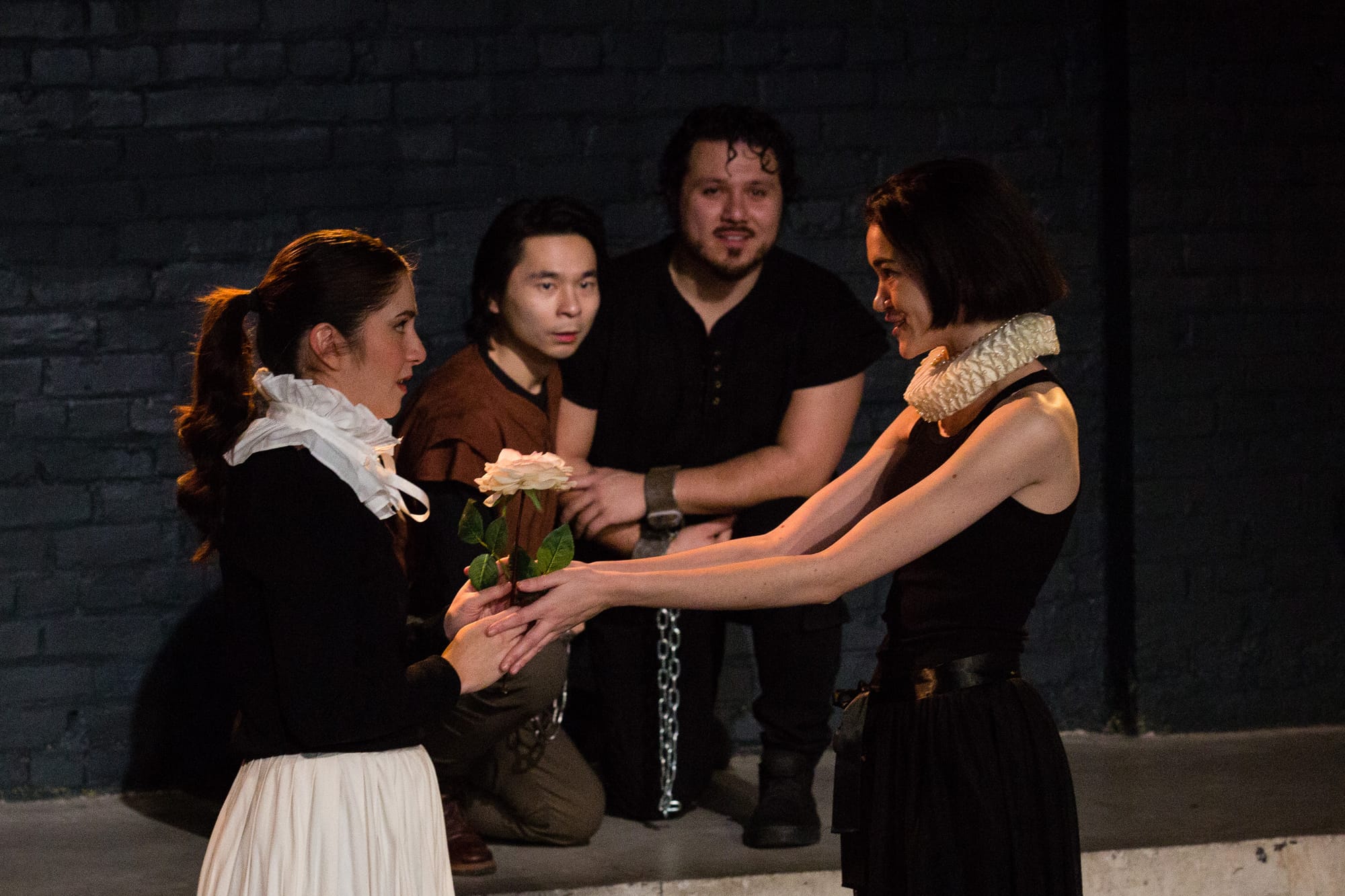Two bold, fresh takes on late Shakespeare plays
Inventive indie companies Theatre Rusticle and Shakespeare BASH'd bring lots of surprises to the Bard

If, like many modern theatregoers, you're suffering from Shakespeare fatigue, two of Toronto's most inventive indie theatre companies will jolt you awake with their bold, invigorating productions of a pair of late works by the Bard.
Allyson McMackon and Theatre Rusticle's version of The Tempest (Rating: ✭✭✭✭) makes you see and experience this familiar work anew. At the outset, five actors – Brefny Caribou, Jill Goranson, Beck Lloyd, Trinity Lloyd and Annie Tuma – announce which roles they'll be taking on.
Four of them will be playing the play's nominal lead, Prospero; all five share the role of the sprite Ariel; there are multiple Ferdinands, Mirandas and Calibans, as well as many representing the court in Naples where Prospero's dukedom was usurped some 12 years earlier.
Confusing? Not at all. McMackon and her gifted design team – costume designers Lindsay Anne Black (hat design), Monica Viani (milliner) and Brandon Kleiman (costumes) – have figured out ways to help us know who's who in Shakespeare's tempest-toss'd island setting.
Until the end, Prospero is always cloaked in a robe; if performers are wearing Black's whimsical hats, they're Ariel; a clanking chain indicates Caliban; neck ruffles suggest someone from the court; and Ferdinand often sports a brown cap.
All this, of course, is in addition to the skilled work of the actors, several of whom are rising stars – Beck Lloyd and Caribou are talented members at the Stratford Festival, and Tuma was the co-creator and one of the leads in 2021's MOBY: A Whale of a Tale.
Having Ariel being performed at times by up to four actors – with lines spoken individually or in unison – evokes the character's quicksilver nature, enhanced by the shimmer of Michelle Ramsay's light on their headpieces and Kleiman's outfits. And it's fascinating to watch how actors bring different energy to their parts; Caribou's early seething rage as Prospero contrasts with Beck Lloyd's wearier approach later on.
Although the staging is stripped down, it's always richly evocative. When Prospero threatens Ariel with the image of their former prison – trapped in that "cloven pine" by Sycorax – the multi-Ariels' reactions make us feel that entrapment. And who needs an elaborate set when Caliban, guided by Ramsay's hypnotic patterned lighting design, seems to take us through a series of tunnels or caves?
Ensemble member Goranson also composed the music (with Kelsi James), which helps us segue seamlessly from scene to scene and, especially when the performers join in a cappella singing, adds to the enchanting atmosphere.
What's so satisfying about this production, however, is its feeling of openness and enquiry. McMackon's production is as much an investigation of The Tempest as it is a version of the play itself. By witnessing the five actors share the dramatis personae, we become aware of how multi-dimensional these characters are. They contain multitudes.
And, in the play's final sequence, the artists are willing to provide the ending Shakespeare wrote but also comment on it. Quite a theatrical coup.
The Tempest continues until January 28 at Buddies in Bad Times (12 Alexander). See info here. See my recent interview with director McMackon here.

Confident Kinsmen
If The Tempest is familiar Shakespeare, The Two Noble Kinsmen (Rating: ✭✭✭✭), the play he wrote a couple of years later with John Fletcher, is rarely performed. Which means most audiences have few preconceptions about it, a wonderful prospect for a modest-sized company like Shakespeare BASH'd.
As director James Wallis shows in his absorbing production, it's a fascinating, if uneven work that plays with tone, genre and convention. And there are some very cool echoes from more familiar plays.
Against a war between Athens and Thebes, Theban cousins Arcite (Michael Man) and Palamon (Emilio Vieira) are captured by Duke Theseus (Jeff Yung) and imprisoned in Athens. Through a window in their cell, they both fall in love with Emilia (Kate Martin), the sister of Theseus's wife, Hippolyta (Melanie Leon). This rivalry destroys their friendship, even though Emilia doesn't seem very taken with either of them (her tastes, it's suggested, run more towards women), and threatens to end in tragedy.
While the early scenes establishing the play's context could use tightening – the tale is lifted from Chaucer and also suggests something Sophoclean – once the contrasting kinsmen are introduced the narrative moves along quickly. Arcite seems more careful and cautious, while Palamon is fiery and impulsive.
And once they are separated – Theseus banishes Arcite, while the Jailer's Daughter (Julia Nish-Napidus), smitten with Palamon, sets him free – the story branches off in intriguing directions.
What's especially fun is spotting the echoes of earlier Shakespeare plays. Theseus and Hippolyta, of course, recall the regal couple from Dream, although their relationship feels less sharply defined here. Also reminiscent of Dream is a comic play-within-a-play scene mounted by a Schoolmaster (Daniel Briere) and his ragtag team of players for noble Athenians. And the Jailer's Daughter has a couple of mad scenes that recall those of other Shakespearean women, and she even evokes a Willow Song that could be lifted straight from Desdemona's memory.
Even the one-upmanship between the two kinsmen brings to mind the testosterone-fuelled fights and skirmishes between Romeo and his bros. What comes through most strongly in Wallis's production is the damage of toxic masculinity.
If there's a flaw, it's that the object of the cousins' affection, Emilia, remains a little vague. I wish she had more to do, or that Martin's interactions with the other actors set off contrasting sparks.
But overall, the ensemble works together well in the sunken space at the Theatre Centre's BMO Incubator. One mid-play fight sequence is thrillingly choreographed by Jennifer Dzialoszynski, who also has a lively scene as a pedantic doctor.
The mixture of comedy and tragedy, sometimes within a single character, gives the play an exciting unpredictability. Which you can't say about most Shakespeare productions.
The Two Noble Kinsmen runs at the Theatre Centre's BMO Incubator (1115 Queen West) until February 4. See info here.
